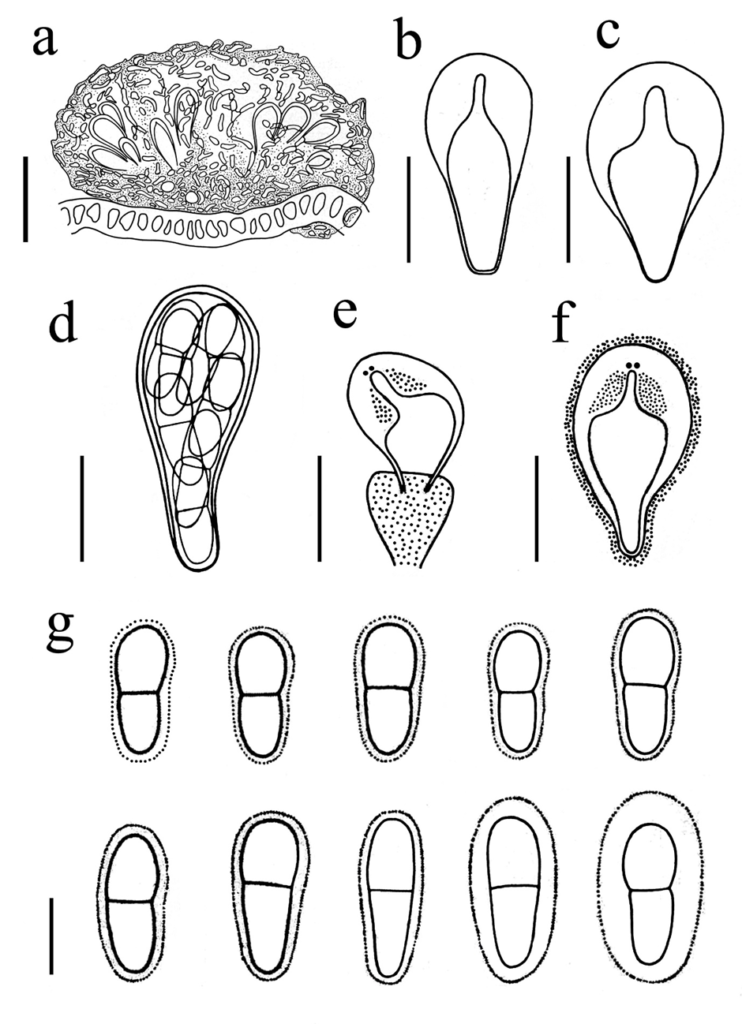Fungalpedia – Note 101 Bryostigma
Bryostigma Poelt & Döbbeler
Citation when using this entry: Meng et al., in prep – Fungalpedia, lichenicolous genera. Mycosphere.
Index Fungorum, Facesoffungi, MycoBank, GenBank, Fig 1
Bryostigma was established by Poelt & Döbbeler (1979) to accommodate the lichen B. leucodontis which is characterized by the red or blue iodine staining of its hyphae, an undifferentiated excipulum, the type of asci, the small size of the fruiting bodies and its growth on moss (Poelt & Döbbeler 1979). Kondratyuk et al. (2019, 2020) published a phylogenetic tree of Arthoniaceae based on concatenated SSU and rpb2 sequences. This showed that eight species of Arthonia clustered with Bryostigma muscicola. Kondratyuk et al. (2019, 2020) therefore transferred these species to Bryostigma based on the phylogenetic analysis. These species are all lichenicolous except for B. lapidicola, which is a lichen. Bryostigma dokdoensis is similar to B. parietinaria, but causes much smaller infection spots (from very indistinct to more or less recognizable to 0.5–1 mm across), and have smaller ascomata (0.08–) 0.1 – 0.13 (–0.14) mm wide, single, round and more or less regular. Bryostigma dokdoensis also has a lower mean number of ascomata per infection spot (5–10 apothecia together in spots to 0.4–0.6 mm diam.), more common conidiomata (conidiomata below ascomata and numerous at the first stages of infection development; conidia 3–4 × 0.8 mm) (Kondratyuk et al. 2019). Etayo et al. (2023) identified that Arthonia excentrica, previously classified as a lichen by Fries (1867), formed a grouping with Bryostigma molendoi and B. dokdoense. Notably, this species is more aligned with its host, encompassing certain members of Lepraria and Leprocaulon. Etayo therefore transferred Arthonia excentrica to Bryostigma excentricum. This species is characterized by I+ red spore walls, a brown hypothecium and 11–13 × 5–6 μm (Etayo et al. 2023). There are 13 lichenicolous species in this genus and 43 sequences belonging to LSU, ITS, rpb2 and SSU in GenBank.
Type species: Bryostigma leucodontis Poelt & Döbbeler, Crustose lichen on moss
Other accepted species (lichenicolous):
Bryostigma apotheciorum (A. Massal.) S.Y. Kondr. & Hur, on Myriolecis albescens
Bryostigma biatoricola (Ihlen & Owe-Larss.) S.Y. Kondr. & Hur, on Biatora efflorescens
Bryostigma dokdoense (S.Y. Kondr., Lőkös, B.G. Lee, J.J. Woo & Hur) S.Y. Kondr. & Hur, on Orientophila
Bryostigma epiphyscium (Nyl.) S.Y. Kondr. & Hur, on Physcia
Bryostigma excentricum (Th. Fr.) Etayo & Pino-Bodas, on Lepraria and Leprocaulon
Bryostigma huriellae S.Y. Kondr. & Hur, on Huriella pohangensis
Bryostigma lobariellae (Etayo) S.Y. Kondr. & Hur, on lobariellae
Bryostigma molendoi (Heufl. ex Arnold) S.Y. Kondr. & Hur, on Caloplaca and Xanthoria
Bryostigma neglectulum (Nyl.) S.Y. Kondr. & Hur, on Lepraria neglecta?
Bryostigma parietinarium (Hafellner & Fleischhacker) S.Y. Kondr. & Hur, on Xanthoria parietina
Bryostigma peltigerinum (Almq.) S.Y. Kondr. & Hur, on Peltigera and Solorina
Bryostigma phaeophysciae (Grube & Matzer) S.Y. Kondr. & Hur, on Phaeophyscia orbicularis
Bryostigma stereocaulinum (Ohlert) S.Y. Kondr. & Hur, on Stereocaulon
Other accepted species (lichens):
Bryostigma curvata Serusiaux,Foliicolous lichen
Bryostigma lapalmae van den Boom & Ertz, Foliicolous lichen
Bryostigma lapidicola (Taylor) S.Y. Kondr. & Hur, Crustose lichen on stone
Bryostigma muscigenum (Th. Fr.) Frisch & G. Thor, Crustose lichen on moss
Figure 1 – Bryostigma leucodontis (redrawn from Poelt & Döbbeler, 1979). a Apothecium. b-f Asci. g Ascospores. Scale bars: a = 40 μm, b-f = 10 μm, g = 5 μm.
References
Fries TM. 1867 – Lichenes Spitsbergenses. Kongliga Svenska Vetenskapsakademiens Handlinger, ser. 2, 7, 3-53.
Poelt J, Döbbeler P. 1979 – Bryostigma leucodontis nov. gen. et spec., eine neue flechte mit fast unsichtbaren fruchtkörpern/Bryostigma leucodontis nov. gen. et spec., a new lichen with almost invisible fruiting bodies. Plant Systematics and Evolution 211–216.
Entry by
Meng QF, Center of Excellence in Fungal Research, Mae Fah Luang University, Chiang Rai, 57100, Thailand and School of Public Health, Zunyi Medical University, Guizhou 563000, China
(Edited by Vinodhini Thiyagaraja & Kevin D. Hyde)
Published online 19 September 2023
